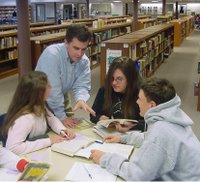A Colorado school turns the homework model upside down
Here is a novel idea worth thinking about. Several math teachers at a Colorado high school have turned the homework-schoolwork model inside out. Instead of using class time to introduce content (my translation: lecturing or providing direct instruction) and then sending students home to solve problems or grapple with that content, they've decided to flip it. Class lectures and other such materials are now available online or burned on a DVD for students to take home. During class time, the students solve problems and work more directly with the teachers. The TV news folks, of course, portray this shift in educational thinking as a renegade high school doing away with homework.
Anyway, it sounds like something that can easily be done in math or maybe science. But what about English? If I flipped the model like that, what would it look like? Kids could listen to discussion of a novel or hear background about the author at home, while we spend time in class reading and making connections to what we read? I don't know if it has quite the same effectiveness. According to the state of Connecticut, my focus should be (in my words) to teach important literacy skills such as making connections to what they read, identifying the craft of the author writing, and even to "appreciate" texts from a variety of cultures. What I do inside F14 must be with those standards in mind. What is it, then, that we need to flip?
We need to find ways to extend and inspire the conversation outside of class so students can understand the richness of exploring a text and making deep personal connections to it. Just exactly how should that be done? If I had the answer to that, I'd open up my own consulting business and charge people for the answer. (By the way, the teachers mentioned in the video do run an educational consulting company. A feature on the 11 o'clock news can't be bad for business.)
Until then, there are ways we can try. I've experimented with having students post comments on a class blog, write blogs themselves and link to one another, create wiki pages and read one another's work. Right now, I'm starting with Google docs, asking two students to collaborate on gathering quoted evidence from The Effect of Gamma Rays on Man-in-the-Moon Marigolds. Down the road, I'm thinking of asking students to use Google chat to have a dialogue outside of class with a classmate about a piece of literature or issue we're discussing and hand in a transcript of that chat session to me.
What else can we do? What have you done?






4 comments:
I actually like the idea of having students go over content on thier own and work on homework type assignments during class. At first it sounds like a great idea that would help the students seemingly learn more. There are however a couple of concerns I have. The first is that you would have to assume that all of the students have access to computers outside of class time. Another concern is that how many of the students would actually take the time to sit down and learn about things on thier own. The last concern I have is that it would be very time consuming for students to try and learn these things on thier own at home. I believe that some things could be taught this way, but that the majority of subjects and curriculum should not be.
I think that this is a good idea for some students but not all. All students have different learning styles. This method of learning would be good for students who are visual or auditory learners but what about the students who are kinesthetic learners. If these students aren't getting input in their style initially, it may be more difficult for them to grasp the concept.
The part of this I like the most is that it allows more time for students and teachers interact and do the hands-on activities. But I think that teachers have to put a lot of responsibility on students to watch the lectures at home. Students may not have the means to do this, the environment for it to be beneficial, or may just choose not to watch it.
I like the idea of having a classroom blog. That leaves the students more accountable for their own learning. What are the guidelines that you give them? What do you do for those that don't have access?
With the advent of e-learning, this shift actually makes a lot of sense. Technology cannot yet help students work through all their questions and obstacles, but it can provide fantastic lectures/presentations.
Post a Comment